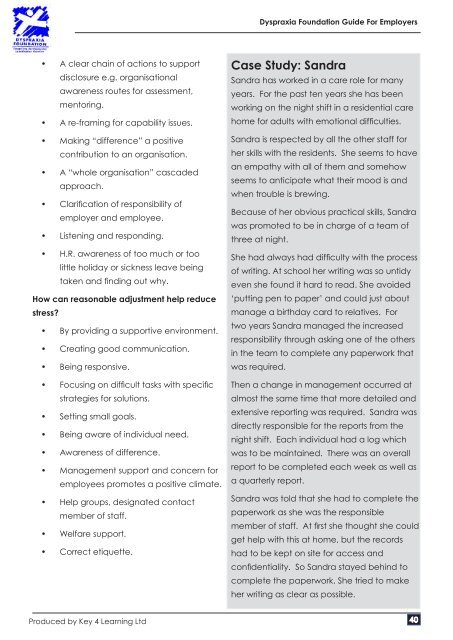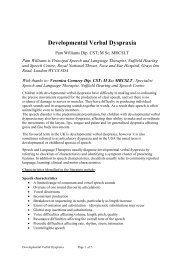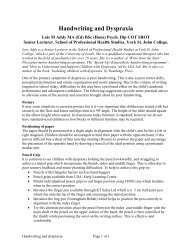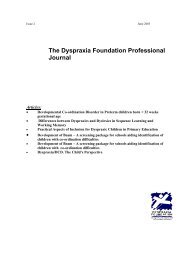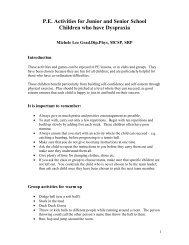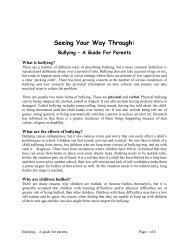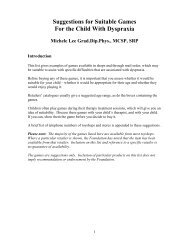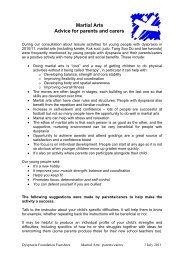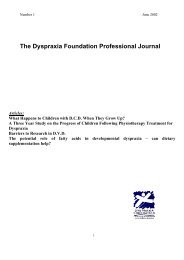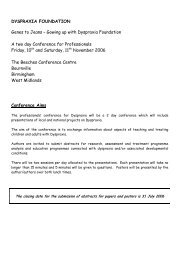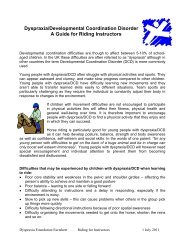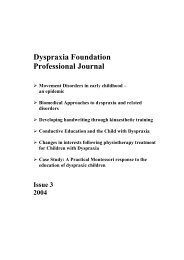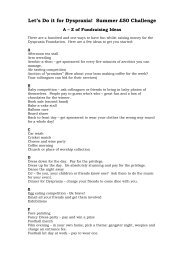Employers Guide - Dyspraxia Foundation
Employers Guide - Dyspraxia Foundation
Employers Guide - Dyspraxia Foundation
Create successful ePaper yourself
Turn your PDF publications into a flip-book with our unique Google optimized e-Paper software.
<strong>Dyspraxia</strong> <strong>Foundation</strong> <strong>Guide</strong> For <strong>Employers</strong><br />
• A clear chain of actions to support<br />
disclosure e.g. organisational<br />
awareness routes for assessment,<br />
mentoring.<br />
• A re-framing for capability issues.<br />
• Making “difference” a positive<br />
contribution to an organisation.<br />
• A “whole organisation” cascaded<br />
approach.<br />
• Clarification of responsibility of<br />
employer and employee.<br />
• Listening and responding.<br />
• H.R. awareness of too much or too<br />
little holiday or sickness leave being<br />
taken and finding out why.<br />
How can reasonable adjustment help reduce<br />
stress?<br />
• By providing a supportive environment.<br />
• Creating good communication.<br />
• Being responsive.<br />
• Focusing on difficult tasks with specific<br />
strategies for solutions.<br />
• Setting small goals.<br />
• Being aware of individual need.<br />
• Awareness of difference.<br />
• Management support and concern for<br />
employees promotes a positive climate.<br />
• Help groups, designated contact<br />
member of staff.<br />
• Welfare support.<br />
• Correct etiquette.<br />
Case Study: Sandra<br />
Sandra has worked in a care role for many<br />
years. For the past ten years she has been<br />
working on the night shift in a residential care<br />
home for adults with emotional difficulties.<br />
Sandra is respected by all the other staff for<br />
her skills with the residents. She seems to have<br />
an empathy with all of them and somehow<br />
seems to anticipate what their mood is and<br />
when trouble is brewing.<br />
Because of her obvious practical skills, Sandra<br />
was promoted to be in charge of a team of<br />
three at night.<br />
She had always had difficulty with the process<br />
of writing. At school her writing was so untidy<br />
even she found it hard to read. She avoided<br />
‘putting pen to paper’ and could just about<br />
manage a birthday card to relatives. For<br />
two years Sandra managed the increased<br />
responsibility through asking one of the others<br />
in the team to complete any paperwork that<br />
was required.<br />
Then a change in management occurred at<br />
almost the same time that more detailed and<br />
extensive reporting was required. Sandra was<br />
directly responsible for the reports from the<br />
night shift. Each individual had a log which<br />
was to be maintained. There was an overall<br />
report to be completed each week as well as<br />
a quarterly report.<br />
Sandra was told that she had to complete the<br />
paperwork as she was the responsible<br />
member of staff. At first she thought she could<br />
get help with this at home, but the records<br />
had to be kept on site for access and<br />
confidentiality. So Sandra stayed behind to<br />
complete the paperwork. She tried to make<br />
her writing as clear as possible.<br />
Produced by Key 4 Learning Ltd


